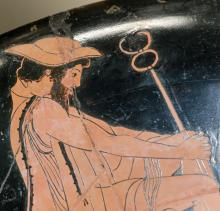(1) Tālī cohortātiōne mīlitum factā, classis ab utrīsque in proelium dēdūcitur. Quārum aciē cōnstitūtā, priusquam signum pugnae darētur, Hannibal, ut palam faceret suīs, quō locō Eumenēs esset, tabellārium in scaphā cum cādūceō mittit.
(2) Quī ubi ad nāvēs adversāriōrum pervēnit epistulamque ostendēns, sē rēgem professus est quaerere, statim ad Eumenem dēductus est, quod nēmō dubitābat, quīn aliquid dē pāce esset scrīptum. Tabellārius, ducis nāve dēclārātā suīs, eōdem, unde erat ēgressus, sē recēpit.
(3) At Eumenēs, solūtā epistulā, nihil in eā repperit, nisi quae ad irrīdendum eum pertinērent. Cuius etsī causam mīrābātur neque reperiēbat, tamen proelium statim committere nōn dubitāvit.
(4) Hōrum in concursū Bīthȳniī Hannibalis praeceptō ūniversī nāvem Eumenis adoriuntur. Quōrum vim rēx cum sustinēre nōn posset, fugā salūtem petiit; quam cōnsecūtus nōn esset, nisi intrā sua praesidia sē recēpisset, quae in proximō lītore erant conlocāta.
(5) Reliquae Pergamēnae nāvēs cum adversāriōs premerent ācrius, repente in eās vāsa fīctilia, dē quibus suprā mentiōnem fēcimus, conicī coepta sunt. Quae iacta initiō rīsum pugnantibus concitārunt, neque, quā rē id fieret, poterat intellegī.
(6) Postquam autem nāvēs suās opplētās cōnspexērunt serpentibus, novā rē perterritī, cum, quid potissimum vītārent, nōn vidērent, puppēs vertērunt sēque ad sua castra nautica rettulērunt.
(7) Sīc Hannibal cōnsiliō arma Pergamēnōrum superāvit, neque tum sōlum, sed saepe aliās pedestribus cōpiīs parī prūdentiā pepulit adversāriōs.
notes
vocabulary
(1) cohortātiō cohortātiōnis f.: exhortation
palam: openly ※
Eumenēs Eumenis m.: Eumenes (II, king of Pergamum in Asia Minor) ※
tabellārius tabellāriī m.: letter-carrier, messenger ※
scapha –ae f.: small boat, skiff
cādūceus –ī m.: herald's staff
(2) adversārius –a –um: opposite, hostile, contrary ※
profiteor –fitērī –fessus sum: declare publicly
quod: because ※
dēclārō –āre: indicate, reveal
(3) irrīdeō –rīdēre –rīsī –rīsum: mock, make fun of
etsī: although ※
(4) concursus concursūs m.: meeting, collision, encounter
Bīthȳnius –ī m.: inhabitant of Bithynia (a kingdom in northern Asia Minor)
ūniversus –a –um: all together
adorior –orīrī –ortus sum: assault, approach (as an enemy)
conlocō –āre: place, station, set up
(5) repente: suddenly
vāsum –ī n.: vase, container ※
fīctilis fīctile: made of clay, earthen ※
mentiō mentiōnis f.: mention ※
coniciō –icere –iēcī –iectum: cast, fling, toss ※
concitō –āre: rouse, excite
(6) oppleō –plēre –plēvī –plētum: fill up
cōnspiciō –spicere –spexī –spectus: catch sight of, perceive
serpēns serpentis f.: snake ※
perterreō –terrēre –terruī –territum: terrify
potissimum: first of all, especially, principally
puppis puppis f.: ship, stern
nauticus –a –um: naval
(7) pedester pedestris pedestre: on foot, on land, of infantry
prūdentia –ae f.: practical skill, intelligence ※

